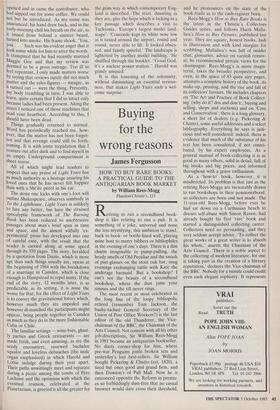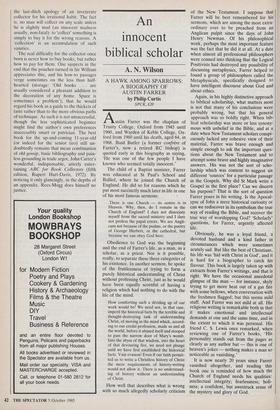Buying for the wrong reasons
James Fergusson
HOW TO BUY RARE BOOKS: A PRACTICAL GUIDE TO THE ANTIQUARIAN BOOK MARKET by William Rees-Mogg
Phaidon/Christie's,
Retiring to run a secondhand book- shop is like retiring to run a pub. It is something of a joke, universal and none the less mystifying, this ambition to stand, back to book- or bottle-lined wall, playing mine host to merry bibbers or bibliophiles in the evening of one's days. There is a dim charm imaginable in pump-pulling, the heady smells of Old Peculiar and the smash of pint-glasses on the stout oak bar, snug evenings exchanging tattle with Kate the underage barmaid. But a bookshop? I can't see the beauty of a secondhand bookshop, where the dust jams your sinuses and the till never rings.
The most recent or most celebrated in the long line of the loopy bibliopolic retired (remember Tom Jackson, the bushy-tached General Secretary of the Union of Post Office Workers?) is the last editor of the old Thunderer, the Vice- chairman of the BBC, the Chairman of the Arts Council. Not content with all his other job-descriptions, Sir William Rees-Mogg in 1981 became an antiquarian bookseller. No dusty corner-shop for him, where pre-war Penguins jostle broken sets and yesterday's lost best-sellers. Sir William bought Pickering & Chatto (est. 1820), a tired but once good and grand firm, and then Dawson's of Pall Mall. Now he is ensconced opposite the Reform in premis- es so forbiddingly dust-free that no casual browser would dare cross their threshold, and he pronounces on the state of the book-trade as to the cash-register born.
Rees-Mogg's How to Buy Rare Books is the latest in the Christie's Collectors Guides series, and follows Huon Malta- lieu's How to Buy Pictures, published last year. They are square, honest books, lush in illustration and with kind margins for scribbling. Mallalieu's was full of insider chat, glossaries, advice on varnish remov- al; he recommended private views for the champagne. Rees-Mogg's is more magis- terial, takes the broader perspective, and even, in the space of 83 quite airy pages, attempts a complete history of the book, its make-up, printing, and the rise and fall of its collectors' favours. He includes chapters on The Art and Practice of Book Collect- ing' (why do it? dos and don't;•, buying and selling, shops and auctions) and on 'Care and Conservation'; there is a long glossary, a short list of dealers (e.g. Pickering & Chatto), some useful addresses and a select bibliography. Everything he says is judi- cious and well considered: indeed, there is evidence that much of the substance of his text has been considered, if not contri- buted, by his expert employees. As a general manual of book-collecting it is as good as many others, solid in detail, full of big books and big prices, and informed throughout with a grave enthusiasm.
As a 'how-to' book, however, it is misdirected. Its problem is that just as the retiring Rees-Moggs are inexorably drawn to run bookshops in their pensionerhood, so collectors are born and not made, The 11-year-old Rees-Mogg, before ever he had sat down on a Carthusian bench to discuss self-abuse with Simon Raven, had already bought his first 'rare' book and started a distinguished collecting career. Collectors need no persuading, and they very seldom accept advice. `To collect the great works of a great writer is to absorb his whole,' asserts the Chairman of the Arts Council. 'There is a noble aspect to the collecting of modern literature, for one is taking part in the creation of a literary reputation,' declares the Vice-chairman of the BBC. Nobody for a minute could credit even such elegant sophistry. It represents the last-ditch apology of an inveterate collector for his irrational habit. The fact is, no man will collect on any scale unless he is slightly mad (an innocent madness usually, non-fatal): to 'collect' something is simply to buy it for the wrong reasons. A `collection' is an accumulation of such vanities.
The real difficulty for the collector once born is never how to buy books, but rather how to pay for them. One suspects in the end that the poacher-turned in Sir William appreciates this, and his how-to passages verge sometimes on the less than half- hearted (storage: 'Old books . . . are usually considered a pleasant addition to the decoration of any home. Space is sometimes a problem'); that he would regard his book as a guide to the thickets of taste rather than to the more obvious paths of technique. As such it is not unsuccessful, though the less sophisticated beginner might find the author's own preferences inaccessibly smart or patrician. The best book for the up-and-coming 11-year-old (or indeed for the senior tiro) still un- doubtedly remains that mean combination of old gossip, basic bibliography and pain- less grounding in trade argot, John Carter's wonderful, indispensable, utterly enter- taining ABC for Book Collectors (fifth edition, Rupert Hart-Davis, 1972). By noticing it only glancingly, in the depths of an appendix, Rees-Mogg does himself no justice.



























































 Previous page
Previous page